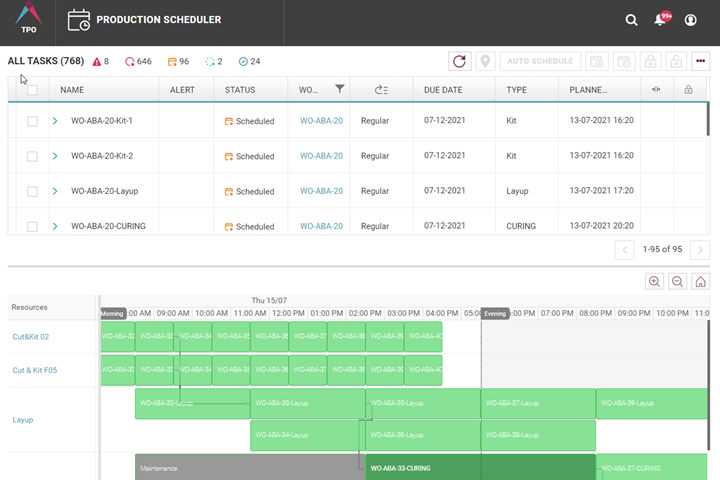Plataine's new Practicum-Optimum AI algorithm optimizes production scheduling
Self-learning algorithm achieves reportedly unprecedented levels of optimized KPIs and schedule practicalization.

Photo Credit: Plataine
Plataine (Waltham, Mass., U.S.), a leading provider of Industrial IoT (IIoT) and AI-based software for manufacturing optimization, has released its new Practimum-Optimum, said to be a breakthrough AI algorithm for optimizing manufacturing planning and scheduling by combining unprecedented levels of optimized KPIs (key performance indicators) with a practical, robust planning application. Plataine’s Production Scheduler is part of Plataine’s TPO (Total Production Optimization), cloud-based suite of interconnected applications, which integrate production scheduling with shop-floor operations management, while optimizing all production resources such as materials, equipment and tools.
Most existing software solutions for scheduling use a search algorithm to optimize top level KPI goals of the overall schedule such as due-date compliance, production throughput or machine utilization. However, once such a schedule is generated, the planner is often required to make countless changes to address specific customer priorities, executability considerations or other practical matters. These are often not fully addressed by the software. These changes would make perfect business sense even if they led to lower KPI scores but require constant human involvement in the process. Plataine’s patent-pending Practimum-Optimum algorithm drives the production scheduler to build optimal schedules that already integrate practical considerations and support the user in further integrating subjective judgment changes.
With its built-in machine learning algorithms, the Practimum-Optimum Scheduler teaches itself deep insights in the schedules’ universe including the trade-offs between competing goals, clusters of similar schedules, patterns of demand sets and best attainable values for each individual KPI score. Historical schedules are not mandatory, though they are very useful when available. These insights are used by the Practimum-Optimum algorithm to produce schedules that are both optimal and practical to execute. Production planners can set target values for any mix of business goals such as on-time delivery, overall equipment efficiency (OEE) or make-span, and the Practimum-Optimum Scheduler algorithm will produce the best practical schedule that is the closest to these targets, including a visual interactive Gantt chart and graphic indicators.
Plataine’s intelligent Digital Assistants accompany users throughout schedule execution, alerting them to deviations in the planned schedule — such as a task that is taking longer than planned — and offering recommendations and insights before a crisis occurs. Over time, as the algorithm is being used and real-life schedules are generated, the learning algorithm adapts its planning capabilities and improves its performance.
Related Content
-
Siemens software chosen for JetZero BWB aircraft concept, launches Xcelerator updates
Aviation startup will use the Xcelerator platform to achieve its aircraft vision. Other Siemens collaborations deliver software additions to deliver, democratize industrial AI for small companies, startups.
-
Altair 2025 Enlighten Award winners, runner-ups push automotive boundaries
Hemp nylon-reinforced PA6 automotive exteriors, TPC acoustic elements, glass fiber stator cooling design and other innovations are recognized for their sustainability focus, holistic capabilities and lightweight designs.
-
UniSQ, iLAuNCH Trailblazer program drive digital twin innovation for composite repairs
Working with Boeing Australia, Memko and Dassault Systèmes, the University of Southern Queensland (UniSQ) has developed a digital twin via the 3DEXPERIENCE platform, digitizing processes that could lead toward more efficient and effective maintenance, repair and operations of future fleets.













